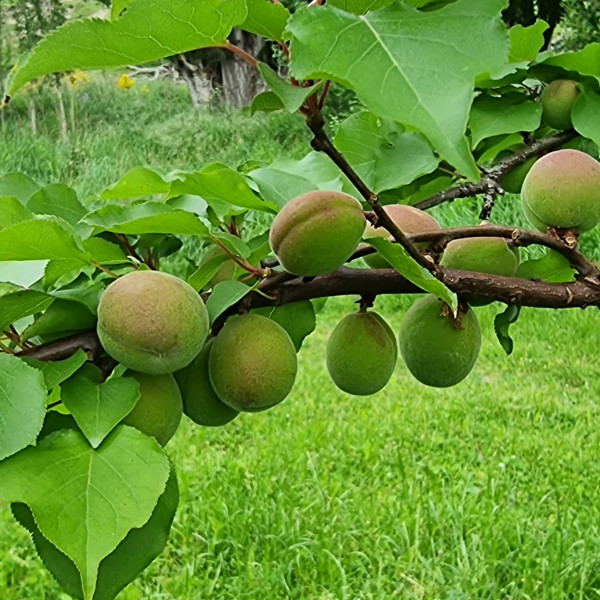Growing optimism for this season's summerfruit
13 December 2023
Central Otago apricot growers are hopeful for a bumper crop this year, after a few challenging seasons.
Simon Webb of Cromwell, who grows 12 different apricot varieties, says last season’s snow event in mid-October wiped out much of his crop, but this year it is quite a different story.
We have bucket loads of high quality fruit. Apricots are biennial and they have set really well this year, thanks to great weather for pollination.
“We’re already talking to the supermarkets so they are prepared and can promote the abundance well, particularly as the fruit will be at good prices.”
As well as a large crop, Simon is confident the fruit will be of good quality as well. “They seem to stay firmer and don’t all ripen at once.”
In early November, a lot of time was invested into thinning out the fruit, with up to 90 percent of the apricot crop pulled off the trees.
“We’re pretty much taking off eight to one, because apricots are really variable in their pollination so we had a lot more flowers on the trees.
“We pruned harder in the winter, but it’s still a heavy crop.”

Strong apricot growth
Peaches and nectarines are also looking good, and there should be plenty of staff this season for picking, with numbers back up to what they used to be pre-Covid-19.
Down in the Teviot Valley, grower Stephen Darling says a good fruit set has made for a positive start to the apricot season, but cooler days during October to November pushed back the harvest time.
“We’re looking forward to seeing volumes of the new varieties coming through, but we have to get the fruit off the orchard first and then to market.”
Being cautiously optimistic, he says this season there is a good opportunity to look at restarting export programmes for apricots, to help stabilise the market.
Stephen is chair of NZ Summer Fresh, which represents more than 20 growers nationwide who are growing the new NZsummer2, 3 and 4 varieties.
“Across the Teviot Valley, we have been fortunate to have two good weeks of critical flowering and pollination after some tough frosts last year.”
The later harvest early in the New Year would make it easier to find staff after everyone has had their holidays.
Stephen said 2017 and 2018 were both bumper crops with record volumes of apricots and an early harvest, but it did clash with the holiday period.
Summerfruit NZ technical advisor Richard Mills says moderate apricot volumes in Hawke’s Bay this year will lead to a slightly earlier harvest. “If the weather systems equally affect both regions, then the full crop in Central Otago could be slightly delayed.
“These factors help alleviate the possible competitive crossover with the large Central Otago crop,” he says.
Richard says the fruit on the trees at this stage of the season “looks as clean as it has ever been,” and the El Niño weather pattern could make for some good fruit for consumers.
“Peaches and nectarines in both growing districts look to have a full crop of clean fruit. Business as usual is the expectation at this stage."
Earnscleugh orchardist Jeremy Hiscock says they have been very lucky this year as El Niño has produced quite a different frost profile.
During September, the orchard only used a quarter of the diesel it used for frost fighting in 2022.
October brought both flooding and repeat snow this year, with two weeks of murky weather over cherry pollination. “While we haven’t had significant damage, it has eroded my sleep,” Jeremy says.
“I’m hopeful it’s going to be an amazing summer. Historically, Central Otago could have frosts up until the last week of November. El Niño was meant to change all that, but we’ve had enough niggly frosts to take the gloss off it.”
He says pollination of fruit was a bit messy on some cherries, as every variety has its own “sweet spot” and there is always the risk of cherry shedding three weeks later.
Orchard consultant Earnscy Weaver explains that cherry shedding is a physiological thing that happens to all stonefruit, but with cherries, it is more pronounced.
He says shedding could happen due to a range of different conditions, from the weather, to tree health, to soil type. “It’s never just one thing that drives it.”
Some varieties of cherry shed more than others, such as Regina™ and Kordia. They are the most difficult to grow in Central Otago.
And of course, sometimes you want shedding to happen when the cherry crop is heavy, to enable a good fruit size, Earnscy says.
Gourmet Summerfruit manager Matt Tyrrell, who operates one of the biggest cherry orchards in the Teviot Valley, says this season’s light frosts made for quite different pollination windows.
He says a lot of their varieties are looking good, such as Lapin, Kordia and Staccato™, but Stella and Sweetheart™ are challenging.
“We’re looking like we’ll have a similar crop to last season.”
On a positive note, the later 10 February Chinese New Year in 2024 suits growers better.
First published in the December issue of The Orchardist.
